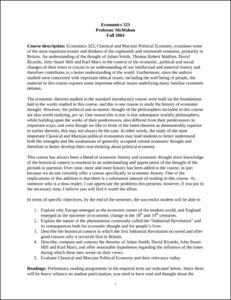Please use this identifier to cite or link to this item:
http://hdl.handle.net/10267/1127Full metadata record
| DC Field | Value | Language |
|---|---|---|
| dc.contributor.author | McMahon, Marshall | - |
| dc.date.accessioned | 2008-02-21T16:31:51Z | - |
| dc.date.available | 2008-02-21T16:31:51Z | - |
| dc.date.issued | 2008-02-21T16:31:51Z | - |
| dc.identifier.uri | http://hdl.handle.net/10267/1127 | - |
| dc.description | This syllabus was submitted to the Rhodes College Office of Academic Affairs by the course instructor. | en_US |
| dc.description.abstract | Economics 323, Classical and Marxian Political Economy, examines some of the most important events and thinkers of the eighteenth and nineteenth centuries, primarily in Britain. An understanding of the thought of Adam Smith, Thomas Robert Malthus, David Ricardo, John Stuart Mill and Karl Marx in the context of the economic, political and social changes of their times is crucial to an understanding of our intellectual and material history and therefore contributes to a better understanding of the world. Furthermore, since the authors studied were concerned with important ethical issues, including the well being of people, the material in this course exposes some important ethical issues underlying many familiar economic debates. The economic theories studied in the standard introductory course were built on the foundations laid in the works studied in this course, and this is one reason to study the history of economic thought. However, the political and economic thought of the philosophers included in this course are also worth studying, per se. One reason this is true is that subsequent worldly philosophers, while building upon the works of their predecessors, also differed from their predecessors in important ways; and even though we like to think of the latest theories as demonstrably superior to earlier theories, this may not always be the case. In other words, the study of the most important Classical and Marxian political economists may lead students to better understand both the strengths and the weaknesses of generally accepted current economic thought and therefore to better develop their own thinking about political economy. This course has always been a blend of economic history and economic thought since knowledge of the historical context is essential to an understanding and appreciation of the thought of the periods in question. Over time, more and more history has been added to the course, in part because we do not currently offer a course specifically in economic history. One of the implications of this addition is that there is a substantial amount of reading in this course. As someone who is a slow reader, I can appreciate the problems this presents; however, if you put in the necessary time, I believe you will find it worth the effort. | en_US |
| dc.language.iso | en_US | en_US |
| dc.publisher | Memphis, Tenn. : Rhodes College | en_US |
| dc.relation.ispartofseries | Syllabi CRN | - |
| dc.relation.ispartofseries | 10244 | - |
| dc.rights | Rhodes College owns the rights to the digital objects in this collection. Objects are made available for educational use only and may not be used for any non-educational or commercial purpose. Approved educational uses include private research and scholarship, teaching, and student projects. For additional information please contact archives@rhodes.edu. Fees may apply. | - |
| dc.subject | Economics, Department of | en_US |
| dc.subject | Syllabus | en_US |
| dc.subject | Curriculum | en_US |
| dc.subject | Academic departments | en_US |
| dc.subject | Text | en_US |
| dc.subject | 2004 Fall | en_US |
| dc.title | ECON 323-01, Classical & Marxian Political Economy, Fall 2004 | en_US |
| dc.type | Syllabus | en_US |
| Appears in Collections: | Course Syllabi | |
Files in This Item:
| File | Description | Size | Format | |
|---|---|---|---|---|
| 2004_fall_ECON_323-01.pdf | 49.4 kB | Adobe PDF |  View/Open |
Items in DSpace are protected by copyright, with all rights reserved, unless otherwise indicated.